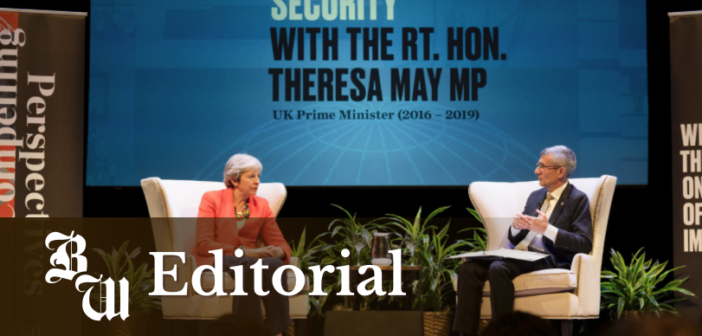President Helble announced that the theme for next school year’s Compelling Perspectives lecture series will be “media in contemporary society.”
As a collection of student journalists, you would think the announcement of a lecture series theme so closely related to our studies and career aspirations would spur a lot of excitement — especially because this specific lecture series was founded on the principle of “freedom of expression on campus” and promises speakers from “a broad range of perspectives.”
But so far, the Compelling Perspectives series has failed to live up to its name in the eyes of The Brown and White editorial board, and this isn’t the first time that we’ve made that opinion known.
We’ve already written about the vague and guarded conversation from Theresa May’s visit last semester, and instead of responding to that criticism with a speaker whose views are underrepresented or particularly thought-provoking, this semester, we got Leon Panetta.
That’s not to say Leon Panetta does not have a perspective worth sharing, but as a middle-of-the-road political figure who has been in the public eye for several decades, he is not the kind of “compelling” figure we were anticipating.
The announcement of the Compelling Perspectives program emphasized respectful engagement and discussion with speakers, “even and especially when discussing issues on which we disagree.”
We absolutely agree that unconventional, or even controversial, speakers and perspectives are valuable for the student body at Lehigh.
But when we see Helble, or whoever is in charge of booking these speakers, opt for such safe, neutral figures, it undercuts the importance of the entire program.
So under the threat of two having to sit through two more obnoxiously safe Compelling Perspectives lectures, we would like to make our desired traits for the next speaker as clear as possible.
Underrepresented Values
There is nothing inherently wrong with having a recognizable figure for a speaker on Compelling Perspectives, but we should be trying to bring in speakers whose perspectives do not fit the norm.
Last year, the Douglass Dialogues, a student-run organization focused on discussing pressing social-cultural and political issues of the day, secured Noam Chomsky as their guest speaker.
Chomsky is one of the most well-known public intellectuals. He’s just as prominent and recognizable as the previous two Compelling Perspectives speakers, but is a significantly more controversial figure with a perspective that leaves room for genuine disagreement.
Authenticity
The two Compelling Perspectives speakers and the most recent Kenner Lecture speaker, Liz Cheney, have all either been on a book tour, actively involved in government, or both.
We are not trying to imply these speakers were being disingenuous during their lectures at Lehigh, but when they have to uphold long-standing political reputations or drive up their book sales, it’s apparent these speakers have a surface level of vulnerability that they are not willing to go beyond.
It seems like a waste of resources to give this platform based on “freedom of expression on campus” to those whose viewpoints are carefully curated to maintain their reputations.
We should seek speakers whose authenticity, underrepresented values and intrigue are a central part of their perspectives and identities.
Only then can we be expected to have the meaningful and respectful discourse these lectures promise.
Controversiality
To be able to practice respectful discourse with those whose perspectives we don’t agree with, we cannot shy away from speakers who spark controversy.
We should be giving controversial figures a platform to share their perspectives, leaving room for these figures to make a connection with students beyond their controversial takes and allowing students to question and engage with these perspectives.
If the administration truly wants the Compelling Perspectives program to be the open exchange of ideas and a beacon of meaningful discourse they claim it is, they must stray away from safe guests and perspectives hindering the program’s namesake thus far.




Comment policy
Comments posted to The Brown and White website are reviewed by a moderator before being approved. Incendiary speech or harassing language, including comments targeted at individuals, may be deemed unacceptable and not published. Spam and other soliciting will also be declined.
The Brown and White also reserves the right to not publish entirely anonymous comments.